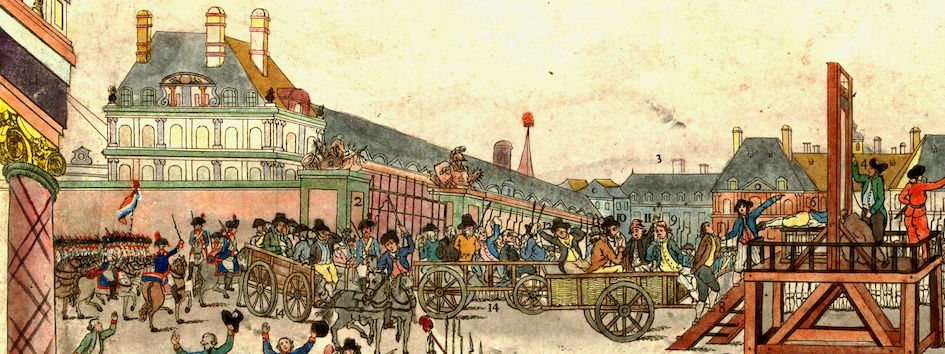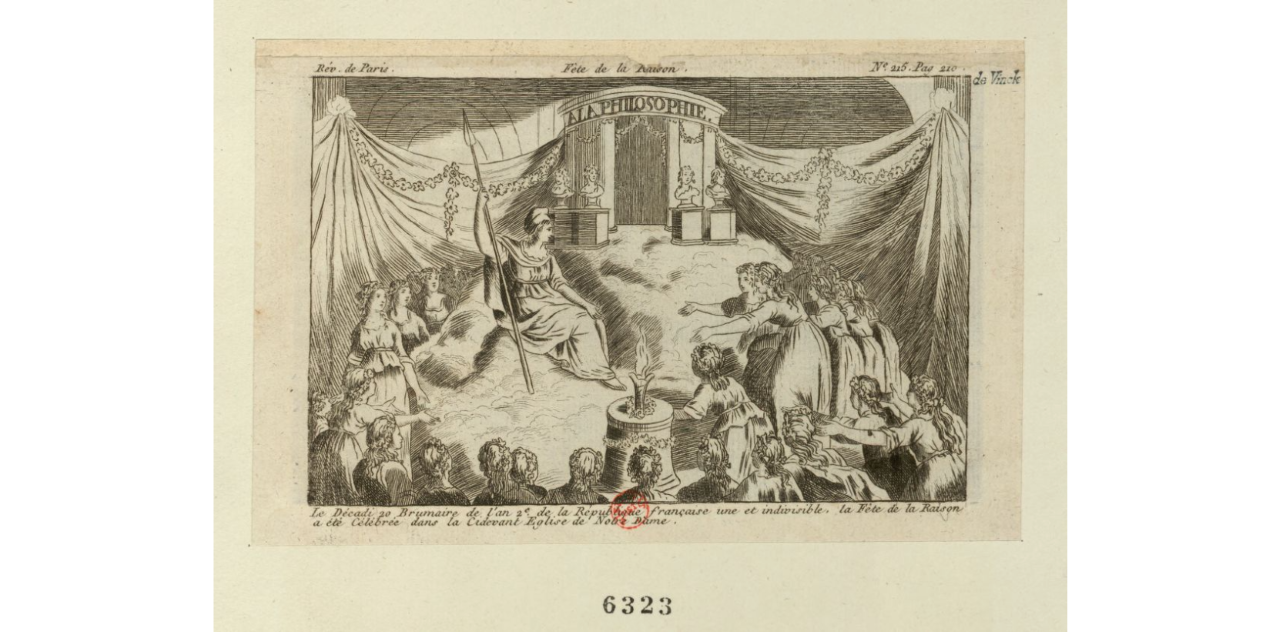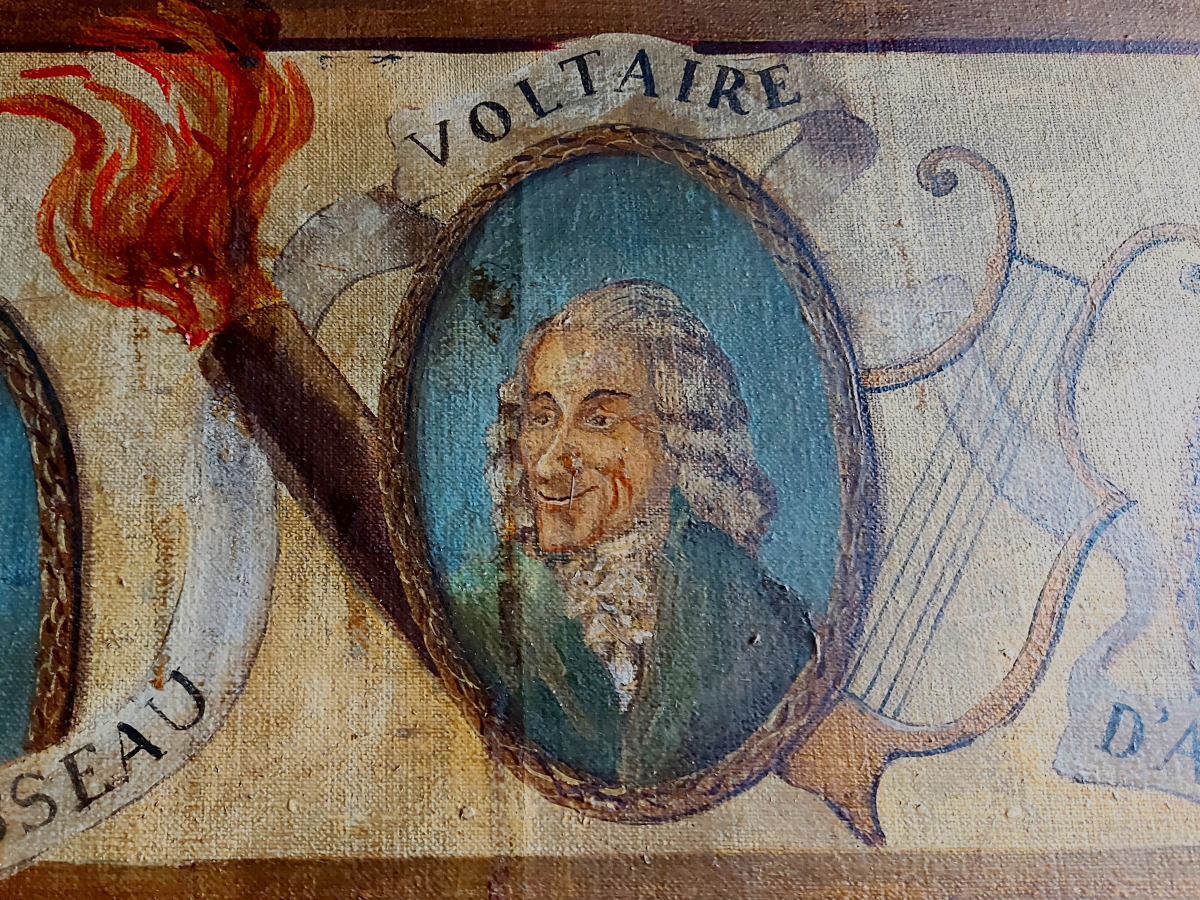
Why the French Revolution Is a Warning for Christians Today
by Patricia Engler on October 7, 2022
Featured in Patricia Engler BlogWith its links to the ideas shaping our culture, its lessons on how anti-Christian agendas unfold, and its power to illustrate the consequences that flow from a society rejecting God’s Word, the French Revolution offers four warnings that Christians today can’t afford to ignore.Standing outside the fire-scarred remains of Paris’ Notre Dame cathedral, I didn’t know about the other flames that had flickered there over 200 years earlier—torches lit to celebrate the “Worship of Reason."
Featured in Patricia Engler Blog
With its links to the ideas shaping our culture, its lessons on how anti-Christian agendas unfold, and its power to illustrate the consequences that flow from a society rejecting God’s Word, the French Revolution offers four warnings that Christians today can’t afford to ignore.
Standing outside the fire-scarred remains of Paris’ Notre Dame cathedral, I didn’t know about the other flames that had flickered there over 200 years earlier—torches lit to celebrate the “Worship of Reason."
 The Notre Dame Cathedral, June 2022.It happened on November 10, 1793. But if you’d asked an onlooker, they’d have told you the date was 20 Brumaire, Year II. To help erase Christianity from society, France’s revolutionary government had invented a new calendar complete with 10-day weeks, renamed months, and years numbered to center history at the Revolution rather than at the advent of Christ.1 Soon after, revolutionaries began promoting secular worship festivals in lieu of Christianity—hence, the “Cult of Reason.”As part of the Notre Dame Festival of Reason, torch-bearing women symbolizing “goddesses” led a procession to an artificial mountain inside the cathedral.2 A “Torch of Liberty” burned on an altar partway to the mountaintop, where a replica temple bore the inscription, To Philosophy.3 Similar festivals took place throughout France, with a “hymn” sung at one such event in 1794 including the line, “Convenez en, mes bons amis: Rousseau vaut miex que St. Pierre” (“Agree, my good friends: Rousseau is better than St. Peter”).4
The Notre Dame Cathedral, June 2022.It happened on November 10, 1793. But if you’d asked an onlooker, they’d have told you the date was 20 Brumaire, Year II. To help erase Christianity from society, France’s revolutionary government had invented a new calendar complete with 10-day weeks, renamed months, and years numbered to center history at the Revolution rather than at the advent of Christ.1 Soon after, revolutionaries began promoting secular worship festivals in lieu of Christianity—hence, the “Cult of Reason.”As part of the Notre Dame Festival of Reason, torch-bearing women symbolizing “goddesses” led a procession to an artificial mountain inside the cathedral.2 A “Torch of Liberty” burned on an altar partway to the mountaintop, where a replica temple bore the inscription, To Philosophy.3 Similar festivals took place throughout France, with a “hymn” sung at one such event in 1794 including the line, “Convenez en, mes bons amis: Rousseau vaut miex que St. Pierre” (“Agree, my good friends: Rousseau is better than St. Peter”).4 The "Festival of Reason" in November, 1793, at Notre Dame. Author: Michel Hennin, 1777–1863 and Vinck, Carl de, 1859-1931. Public domain image retrieved from the Images de la Révolution Française Collection of Bibliothèque nationale de France, available from Stanford Libraries.Rousseau, an eighteenth-century philosopher who believed that humans are inherently good, had argued that a totalitarian government ruled by majority consensus would offer true liberty. But— ironically, given Rousseau’s faith in human goodness—the Revolution which championed Rousseau’s ideas hunted, imprisoned, and guillotined thousands of humans in the name of this “liberty.” Despite its destructiveness, later revolutionaries including Karl Marx deemed the French Revolution an admirable, if incomplete, success.5 As a large contemporary Marxist organization currently declares on its website,
The "Festival of Reason" in November, 1793, at Notre Dame. Author: Michel Hennin, 1777–1863 and Vinck, Carl de, 1859-1931. Public domain image retrieved from the Images de la Révolution Française Collection of Bibliothèque nationale de France, available from Stanford Libraries.Rousseau, an eighteenth-century philosopher who believed that humans are inherently good, had argued that a totalitarian government ruled by majority consensus would offer true liberty. But— ironically, given Rousseau’s faith in human goodness—the Revolution which championed Rousseau’s ideas hunted, imprisoned, and guillotined thousands of humans in the name of this “liberty.” Despite its destructiveness, later revolutionaries including Karl Marx deemed the French Revolution an admirable, if incomplete, success.5 As a large contemporary Marxist organization currently declares on its website,That the greatest minds of our movement placed so much importance on understanding the French Revolution is no accident. Today, more than ever, a conscientious study of the Revolution is essential for anyone who seeks to change the world.6
In a sense, those words ring as true for Christians as for Marxists. With its links to the Marxist-Rousseauean thinking shaping today’s culture, its lessons on how anti-Christian agendas unfold, and its importance as a case study of the consequences which flow from a society rejecting God’s Word,7 the French Revolution offers reminders that Christians today can’t afford to ignore. Let’s look closer at the French Revolution, beginning with the worldview climate in which it arose.Before the Revolution: A Crisis of WorldviewsRome had conquered France before the time of Christ, leaving France officially Roman Catholic after the empire’s Christianization. But the sixteenth and seventeenth centuries brought two movements that would shake France’s religious landscape: the Reformation, which called people to embrace God’s Word as the authority for truth, and the Renaissance, which began promoting human thinking as the authority above God’s Word. These rumblings of humanism swelled to an explosion of unbiblical philosophy during the Enlightenment.While multiple French Enlightenment philosophers (philosophes) helped create the worldview climate behind the Revolution, one especially notable philosophe is Voltaire. Voltaire, an avid deist, believed that an impersonal “Supreme Being” had created the world and had given humans consciences to deduce certain moral codes but had not revealed himself through Scripture.8 So, Voltaire rejected the biblical revelation of a personal, triune God who sent his Son to redeem fallen creation.9 Believing that “theological religion is the enemy of mankind,”10 Voltaire tirelessly reviled Christianity, Judaism, and the biblical God;11 attacked Scripture;12 and fought unsuccessfully to pit science against the Bible.

The Notre Dame Cathedral, June 2022.
It happened on November 10, 1793. But if you’d asked an onlooker, they’d have told you the date was 20 Brumaire, Year II. To help erase Christianity from society, France’s revolutionary government had invented a new calendar complete with 10-day weeks, renamed months, and years numbered to center history at the Revolution rather than at the advent of Christ.1 Soon after, revolutionaries began promoting secular worship festivals in lieu of Christianity—hence, the “Cult of Reason.”
As part of the Notre Dame Festival of Reason, torch-bearing women symbolizing “goddesses” led a procession to an artificial mountain inside the cathedral.2 A “Torch of Liberty” burned on an altar partway to the mountaintop, where a replica temple bore the inscription, To Philosophy.3 Similar festivals took place throughout France, with a “hymn” sung at one such event in 1794 including the line, “Convenez en, mes bons amis: Rousseau vaut miex que St. Pierre” (“Agree, my good friends: Rousseau is better than St. Peter”).4

The "Festival of Reason" in November, 1793, at Notre Dame. Author: Michel Hennin, 1777–1863 and Vinck, Carl de, 1859-1931. Public domain image retrieved from the Images de la Révolution Française Collection of Bibliothèque nationale de France, available from Stanford Libraries.
Rousseau, an eighteenth-century philosopher who believed that humans are inherently good, had argued that a totalitarian government ruled by majority consensus would offer true liberty. But— ironically, given Rousseau’s faith in human goodness—the Revolution which championed Rousseau’s ideas hunted, imprisoned, and guillotined thousands of humans in the name of this “liberty.” Despite its destructiveness, later revolutionaries including Karl Marx deemed the French Revolution an admirable, if incomplete, success.5 As a large contemporary Marxist organization currently declares on its website,
That the greatest minds of our movement placed so much importance on understanding the French Revolution is no accident. Today, more than ever, a conscientious study of the Revolution is essential for anyone who seeks to change the world.6
In a sense, those words ring as true for Christians as for Marxists. With its links to the Marxist-Rousseauean thinking shaping today’s culture, its lessons on how anti-Christian agendas unfold, and its importance as a case study of the consequences which flow from a society rejecting God’s Word,7 the French Revolution offers reminders that Christians today can’t afford to ignore. Let’s look closer at the French Revolution, beginning with the worldview climate in which it arose.
Before the Revolution: A Crisis of Worldviews
Rome had conquered France before the time of Christ, leaving France officially Roman Catholic after the empire’s Christianization. But the sixteenth and seventeenth centuries brought two movements that would shake France’s religious landscape: the Reformation, which called people to embrace God’s Word as the authority for truth, and the Renaissance, which began promoting human thinking as the authority above God’s Word. These rumblings of humanism swelled to an explosion of unbiblical philosophy during the Enlightenment.
While multiple French Enlightenment philosophers (philosophes) helped create the worldview climate behind the Revolution, one especially notable philosophe is Voltaire. Voltaire, an avid deist, believed that an impersonal “Supreme Being” had created the world and had given humans consciences to deduce certain moral codes but had not revealed himself through Scripture.8 So, Voltaire rejected the biblical revelation of a personal, triune God who sent his Son to redeem fallen creation.9 Believing that “theological religion is the enemy of mankind,”10 Voltaire tirelessly reviled Christianity, Judaism, and the biblical God;11 attacked Scripture;12 and fought unsuccessfully to pit science against the Bible.
 A portrait of Voltaire, part of a painting displayed in the 17th-century Café Procope in Paris.While Voltaire and other philosophes had no excuse for rejecting the Creator revealed in Scripture,14 it’s worth pointing out where their criticisms of religious institutions were biblically valid. Unpacking the religious climate in pre-revolutionary France could fill entire books,15 but here are just three of the relevant problems.
A portrait of Voltaire, part of a painting displayed in the 17th-century Café Procope in Paris.While Voltaire and other philosophes had no excuse for rejecting the Creator revealed in Scripture,14 it’s worth pointing out where their criticisms of religious institutions were biblically valid. Unpacking the religious climate in pre-revolutionary France could fill entire books,15 but here are just three of the relevant problems.

A portrait of Voltaire, part of a painting displayed in the 17th-century Café Procope in Paris.
While Voltaire and other philosophes had no excuse for rejecting the Creator revealed in Scripture,14 it’s worth pointing out where their criticisms of religious institutions were biblically valid. Unpacking the religious climate in pre-revolutionary France could fill entire books,15 but here are just three of the relevant problems.
.jpeg)